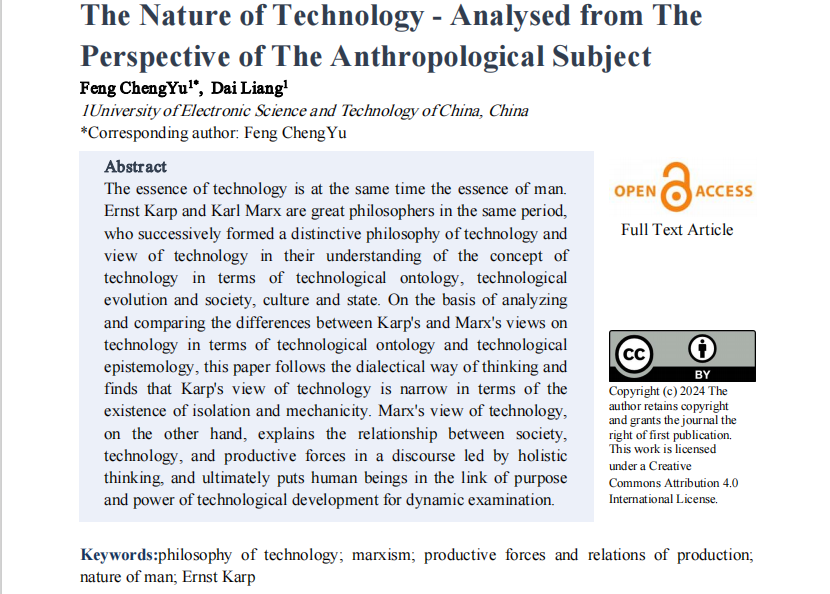The Nature of Technology - Analysed from The Perspective of The Anthropological Subject
DOI:
https://doi.org/10.5281/zenodo.14566201Keywords:
philosophy of technology; marxism; productive forces and relations of production; nature of man; Ernst KarpAbstract
The essence of technology is at the same time the essence of man. Ernst Karp and Karl Marx are great philosophers in the same period, who successively formed a distinctive philosophy of technology and view of technology in their understanding of the concept of technology in terms of technological ontology, technological evolution and society, culture and state. On the basis of analyzing and comparing the differences between Karp's and Marx's views on technology in terms of technological ontology and technological epistemology, this paper follows the dialectical way of thinking and finds that Karp's view of technology is narrow in terms of the existence of isolation and mechanicity. Marx's view of technology, on the other hand, explains the relationship between society, technology, and productive forces in a discourse led by holistic thinking, and ultimately puts human beings in the link of purpose and power of technological development for dynamic examination.
References
[1]Kapp, E. (2015). Grundlinien einer Philosophie der Technik: zur Entstehungsgeschichte der Kultur aus neuen Gesichtspunkten (Vol. 675). Felix Meiner Verlag.
[2]Mitcham, C., & Mackey, R. (Eds.). (1983). Philosophy and technology (Vol. 80). Simon and Schuster.
[3]Sass, H. M. (1980). Man and his environment: Ernst Kapp’s pioneering experience and his philosophy of technology and environment. German culture in Texas: A free earth, 82-101.
[4]Marx, K. (1972). Karl Marx and Frederick Engels. Collected Works, 12.
[5]Hubig, C., Huning, A., & Ropohl, G. (2000). Nachdenken über Technik: die Klassiker der Technikphilosophie. (No Title).
[6]Kapp, E. (2015). Grundlinien einer Philosophie der Technik: zur Entstehungsgeschichte der Kultur aus neuen Gesichtspunkten (Vol. 675). Felix Meiner Verlag.
[7]Mitcham, C. (2022). Thinking through technology: The path between engineering and philosophy. University of Chicago Press.
[8]Hubig, C., Huning, A., & Ropohl, G. (2000). Nachdenken über Technik: die Klassiker der Technikphilosophie. (No Title).
[9]Marx, K., & Engels, F. (1975). Marx & Engels Collected Works Vol 02: Marx: 1835-1843. Lawrence & Wishart.
[10]Marx, K., & Engels, F. (1975). Marx & Engels Collected Works Vol 02: Engels: 1838-1842.
[11][18]Marx, K., & Engels, F. (2009). Karl Marx & Friedrich Engels. Collector's Library.
[12][16]Marx, K., & Engels, F. (1973). Karl Marx on society and social change: With selections by Friedrich Engels. University of Chicago Press.
[13]Marx, K., & Engels, F. (2009). Karl Marx & Friedrich Engels. Collector's Library.
[14]Sass, H. M. (1980). Man and his environment: Ernst Kapp’s pioneering experience and his philosophy of technology and environment. German culture in Texas: A free earth, 82-101.

Downloads
Published
How to Cite
Issue
Section
License
Copyright (c) 2024 ChengYu Feng, Liang Dai

This work is licensed under a Creative Commons Attribution 4.0 International License.


























